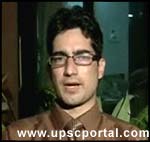Success Mantra : A Desire To Serve Society
Shah Faisal, a doctor by profession, has topped the UPSC exam this
year. He tells Abhishek Ghosh what it takes to clear the prestigious
civil services exam in the first attempt.

Ihad to turn water to cheese, says Shah Faisal, who is the first
person from Jammu and Kashmir to come first in the UPSC exam. Faisal, who
completed his MBBS only last year, insists that he became a doctor by
default. And yet his is a story of passion finding its path.
Growing up in a village in Sogam, Kupwara, he says that he lacked the
exposure that big city kids have, so he drifted into the medical profession.
“In Srinagar, there is a craze about the medical profession and my father
also wanted me to become a doctor, so I willingly complied,” he adds.
It was during his stint in MBBS that he met Dr Abdul Ghani Mir — an IPS
officer. More interactions ensued, and the drifting, freewheeler had found
his calling. “You are always affected by your surroundings. The abject
poverty around me and harsh living conditions had made me restless. When I
met Dr Mir, it was as if I had found the key to the door. It was a eureka
moment for me. I knew if I qualify for this I could contribute to society in
a massive way,” he says breathlessly. “We used to have long discussions on
every subject under the sun and it helped shape my world-view, it widened my
horizons and gave me a purpose.”
After completing his MBBS degree, Faisal had just two months before the
prelims. “I completely immersed myself in studies, shut out the rest of the
world. I realised I had only two months to realise a long-cherished dream.”
As it happened May 17, 2009, the date of the prelims exam was also his
birthday.